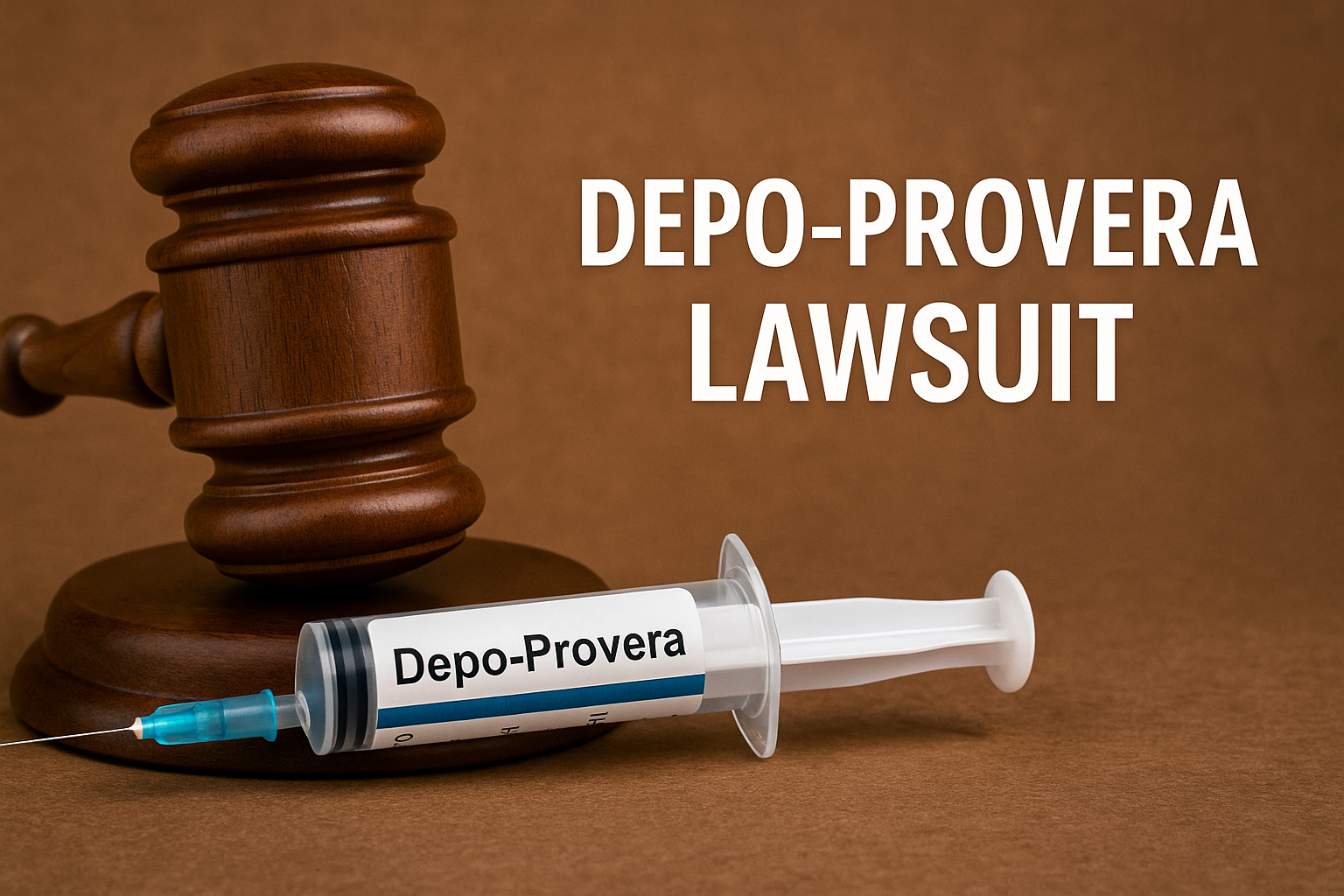Depo-Provera is a birth control shot. Doctors give it once every three months. The injection contains medroxyprogesterone acetate, a lab-made hormone. This hormone stops ovulation. It also thickens cervical mucus and thins the uterine lining. These changes make it hard for sperm to reach an egg or for a pregnancy to start.
Millions of women across the world have used this method. It became popular because it was easy and effective. No daily pills. No devices. Just one shot every 12 weeks. That promise gave many women peace of mind.
But now, new reports raise serious concerns. Some women developed brain tumors after long-term use. Others struggled with infertility, depression, or unexplained pain. Many say they were never warned about these risks.
This article breaks it all down. You’ll learn about the lawsuits. You’ll see who is involved, what the research shows, and how people are fighting back. If you or someone close to you used Depo-Provera and later faced health problems, this guide shows what to do next.
What Is Depo Provera
Pfizer introduced Depo Provera in the 1990 . The FDA gave it approval in 1992. The shot became a top choice for birth control. Women only needed it four times a year. This made it easier than daily pills or monthly patches.
Doctors injected it into the arm or buttocks. It worked well to prevent pregnancy. Still, growing evidence shows long-term risks. Some users developed brain tumors. Others had lasting side effects.
Health Risks Connected to Depo-Provera
1. Meningioma (Brain Tumors)
Meningioma forms in the tissues around the brain and spine. These tumors press against brain areas. That causes seizures, vision problems, and trouble speaking.
Some women needed brain surgery. Many still deal with pain and anxiety. In 2024, the British Medical Journal reported alarming data. Women using Depo-Provera had a 400% higher risk of meningioma. A separate study showed a 50% rise in risk compared to non-users.
Signs to watch for include:
-
Headaches
-
Blurred vision
-
Nausea
-
Missed periods
-
Trouble speaking
-
Seizures
These tumors can lead to major health problems.
2. Bone Density Loss
Doctors raised early warnings about this issue. Women under 25 faced the highest risk. This age is critical for bone growth. Depo-Provera weakened their bones. Some suffered fractures or developed osteoporosis.
3. Infertility
Several women could not get pregnant after stopping Depo-Provera. Many said no one warned them about this risk. They kept using the shot for years. Their doctors said it was safe. Later, they found it affected their ability to conceive.
4. Mental Health Problems
Many women reported mood swings. Some dealt with depression or anxiety. These symptoms disrupted their lives. Plaintiffs claim the drug harmed their mental health.
5. Weight Gain and Other Issues
Common side effects include:
-
Irregular periods
-
Hair loss
-
Skin changes
-
Bloating
-
Fatigue
-
Breast tenderness
-
Appetite increase
-
Liver problems
-
Blood clots
-
Vaginal dryness
Some side effects never went away.
Allegations Against Pfizer
Many lawsuits accuse Pfizer of hiding the risks. Plaintiffs say the company failed to warn doctors and users. Some labels did not mention brain tumors. Canada added that warning in 2015. The U.S. label did not.
Women trusted the product. They now deal with serious health damage. Plaintiffs say the company knew more than it shared.
Timeline of the Lawsuit
What Happened in 2024
-
March 27: New research linked Depo-Provera to brain tumors. Long use raised the risk by 5.6 times.
-
October 1: Kristina Schmidt filed a lawsuit in California. She used the shot from 2005 to 2021. In 2022 doctor diagnosed her with meningioma. She needed brain surgery.
-
October 18: Ajanna Lawson sued Pfizer. She used Depo-Provera from age 16. She later developed two brain tumors. Doctors removed them through surgery.
-
October 24: Monique Jones filed her case in California. She claimed the company failed to test the drug properly.
-
October 28: Kathleen Fazio filed a complaint. She used the shot for almost 20 years. Doctors removed multiple brain tumors.
-
November 4: Mayra Valencia had a tumor removed. She filed her case in federal court.
-
November 14: Tina Stephens-Smith filed her lawsuit. She had three meningiomas. One remains despite 30 radiation treatments.
-
November 15: More lawsuits followed. Many women had used the shot for over a decade.
-
November 26: Lawyers petitioned the JPML to combine 22 lawsuits. They proposed moving the case to California.
-
December 10: A motion requested Judge Josephine Staton to handle all federal claims. The case count reached 28.
What Happened in 2025
-
January 7: Pfizer agreed to centralize the lawsuits. The company preferred New York, where it is based.
-
January 30: The JPML scheduled a hearing in Miami. At that time, 47 lawsuits were active in 12 federal districts.
What You Should Do If You Were Harmed
Legal action may be the next step. Here’s how the process works:
Step 1: Speak to a Lawyer
Find a lawyer who knows product liability. Choose one with experience in medical cases.
Step 2: File a Complaint
Your lawyer will file the lawsuit. You will need to provide medical records and proof of harm.
Step 3: Share Evidence
Both sides will exchange documents. This stage helps reveal what the company knew.
Step 4: Negotiate a Settlement
Most cases settle outside court. A strong case can lead to compensation. You may receive money for medical bills, pain, or lost income.
Final Thoughts
The Depo-Provera lawsuits show why full disclosure matters in healthcare. Women deserve clear, honest information before choosing any treatment. Many took this shot believing it was safe. They followed medical advice. They trusted the product. They did not expect to face life-altering consequences.
Now, they live with permanent health problems. Some developed brain tumors that required surgery. Others cannot have children anymore. Many deal with anxiety, depression, or chronic pain. These outcomes were never clearly explained. That silence caused real harm.
Companies must put patient safety first. Drug makers should test their products fully. They should share all known risks. They must update labels when new evidence appears. No one should suffer because a company chose profit over safety.
You have legal rights. The law allows you to demand answers. If Depo-Provera caused you harm, you do not have to stay silent. Speak to a lawyer who understand these case. A strong legal team can help you file a claim gather proof and seek compensation.
You may qualify for financial recovery. That includes costs for medical treatment, lost work, and emotional pain. Your case could also help others. Legal action can force change. It can lead to better warnings, safer products, and more honest health care.
Justice starts with one step. Reach out. Ask questions. Protect your rights.




